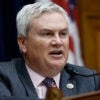March Madness is in full swing. And former Harvard basketball player and current Secretary of Education Arne Duncan has once again “renewed his call for the N.C.A.A. to impose stricter penalties on universities that do not graduate enough of their athletes,” reports The Washington Post.
The Secretary noted that while most colleges take academics for their athletes seriously, there are still some who don’t. “And I just fail to understand why we continue to reward that behavior rather than not tolerate it,” Duncan told the Post. The article went on to list schools that fail to graduate a majority of their athletes yet receive significant revenue from their sports teams.
Currently, the N.C.A.A. requires teams to graduate at least 50 percent of their players or potentially face the loss of scholarships. If schools fail to reach the 40 percent mark several years in a row, they could risk a “postseason ban.“
Certainly, colleges should promote good academics for their athletes. But what if a standard similar to that applied to college athletic programs applied to the education taking place right in Secretary Duncan’s own backyard?
Recent data clearly show that a little more than half—56 percent—of D.C. public school students graduate from high school. Yet, while the Obama Administration continues to push for increased spending on public school systems in D.C. and throughout the country (D.C. public schools currently spend nearly twice the national average on annual per-pupil education costs), they have stood by and let funding for the all-star D.C. Opportunity Scholarship Program (DCOSP)—which graduates more than 90 percent of its students—be all but phased out.
But by Duncan’s own standard, the DCOSP should be his number one bracket pick.
Since 2003, the D.C. Opportunity Scholarship Program has helped give thousands of students from low-income families a shot at an educated future. Through the program, students from these families are able to receive scholarships to attend a private school of their choice, allowing many to escape failing and often violent schools. For many of these children, this has meant the difference between dropping out and earning a diploma. One scholarship recipient, senior Ronald Holassie of Archbishop Carroll High School, stated that the program had been a “life-changing experience” and that “I wouldn’t be the person I am … if it wasn’t for the D.C. Opportunity Scholarship Program.”
The Obama Administration talks big when it comes to improving education. So, instead of taking away a scholarship program that is having such a remarkable effect on the lives of D.C. students and their families, they should cheer it on. At a time when education in the United States is in dire need of improvement, benching a program that is successfully meeting that goal is only, well, madness.





























